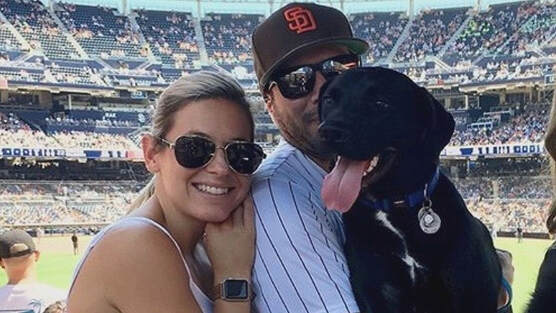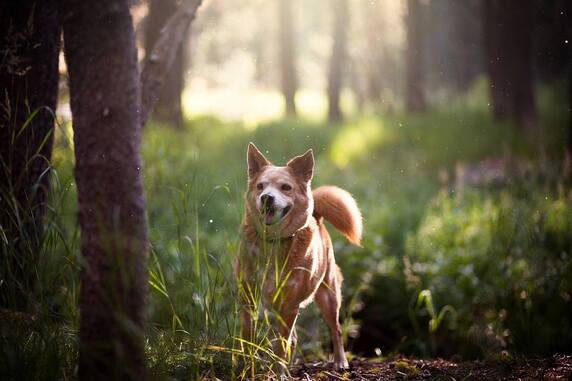|
Pop quiz. A dog wanders onto your property or up to your front door. He looks dirty, is thin and has some blood on his fur. He’s not wearing a collar and is a bit scared, but appears friendly. Which of the following describes how you react and what you do? You -
If you answered with number 1 only, I hope you never cross paths with a lost dog. If you answered with any combination of numbers 2 through 5, you likely don’t have a very high opinion of others and you may end up committing a crime. If you answered with any combination of 6-10, you are to be commended. Millions of us share our lives and homes with companion animals and most of us consider them family members. It can be difficult to think of them as property, but that is what they are considered under the law, just like our cars and our furniture. The big difference is that most of our property cannot get lost, get confused or feel pain. Case law on the subject of animals as property and the value of those animals when they are stolen or killed is evolving. We have not reached a time in our society that animals have a status separate from the other things we “own.” Other countries have taken that step. In some ways this is a good thing. As long as my dog is my property, I have certain rights regarding the ability of someone else to keep him from me or the ability of law enforcement authorities to seize him from me. Animals get lost for a variety of reasons and not all of them relate to people being irresponsible. Most of us have heard the story of the dog who went missing on a family trip after having managed to get through a hotel door during a bad storm. The Washington family looked for him for 57 days before he was found in a field near a subdivision. We hear all the time about pets who have gone missing after automobile accidents. A few years ago, just that happened to a co-worker of mine. My co-worker and her family were on their way home from a trip and were traveling on a major highway when they were involved in an accident. Their dog was in the car. Although he was not seriously hurt by the accident, he was scared. The minute they opened the door he ran and kept running. They looked for him for hours and were not able to find him that same night. They kept looking for weeks and were ultimately able to find him with the help of a team of volunteers. A similar thing happened just this past weekend in Arizona. (image of Obi and his family courtesy of Nicole Rodriguez) Companion animals get lost or loose for so many reasons. A gate is left open, a contractor does not close a door, a child opens a door to go outside and an animal pushes past him or her. A dog or cat jumps a fence following a loud noise which scares them, including fireworks or gunshots. Our default assumption may be that an animal we encounter is loose because someone is to blame or people just don’t care enough. That is certainly the case some times, but most definitely not all of the time. My husband and I have personally encountered numerous lost animals over the years, many of whom we found on or near our rural property. I admit there was a time when I presumed the worst of people. I wondered how they could “allow” their pets to get loose or how they could care so little to “dump” their pets in a rural area, presuming they would be able to survive. My position on this has evolved over the years as my education on animal welfare issues has also evolved. We once had a shockingly thin hunting dog show up at our front door. “Buck” was wearing a tracking collar with a phone number which, thankfully, was still valid. It turns out he had gone missing from a pack of hunting dogs and had been missing for weeks. We didn’t feel great giving him back to the owner who showed little emotion when he came to retrieve Buck from our property, but we did it because it was the right thing to do. The last dog we “found” was crossing a busy highway a few miles from our house. I felt sure he would be hit by a car. Rich pulled into a nearby parking lot and was able to coax him toward our truck with some dog biscuits. “Buddy” was covered in mud so we took him home, cleaned him up a bit, contacted local animal control authorities to explain what happened (and in case there were any reports of a missing dog) and housed him in our workshop until we could get him to a rescue group which scanned him and held him for his “property hold period.” We drove around the area for weeks looking for lost dog signs and looking for properties my may have come from. He was a Great Pyrenees and we thought me might have come from a parcel on which livestock were kept. I posted about him on social media and on a website called Helping Lost Pets. I feel confident his family must have been looking for him just because he was such a stunning, laid back dog. The connection was never made and Buddy was later adopted by a wonderful family. I have often joked about “liberating” animals I see living in what I consider substandard conditions and know people who have done just that, one of whom was convicted a few years ago of theft and receiving stolen property. Another contact of mine is facing criminal charges now for her involvement with placing a blind dog who left his property, ran into the road and almost caused an accident. I hope she has found a criminal defense attorney and will find a way to negotiate return of the dog, perhaps with some agreement that the family not let a blind dog outside unattended. For me, it’s just talk. As much as I would like many of the animals I see to live the way my dog lives, they do not belong to me and there would be real world consequences to stealing them. I try to find other ways to help them either by donating items to be used for their care or enlisting the aid of rescue groups to approach the owners toward improving the conditions for the animals or encouraging the owners to surrender the animals instead. (image courtesy of Chriss Pagani) I see information every week about animals who are lost and the people who find them. These are people I would ordinarily consider Good Samaritans who mean well, but may not always make the best choices. I also learn at least once every few months about someone who has purposefully stolen an animal or animals. They do this knowing who owns the animal but while having made a conscious decision to take one or more animals because they don’t think the owner is caring for the animal properly.
If you find a lost animal, even if that animal comes on your property, you are not entitled to keep that animal any more than you are entitled to keep a car parked near your house with the keys in the ignition, the wallet you find when walking through a parking lot or the bicycle you see leaning against a wall outside of a business. If you knowingly keep a person’s property from them and/or later transfer that property to another person, you have committed a crime regardless of your good intentions. Every state has its own criminal laws about theft of property and receiving stolen property. In my state, theft of property in the fourth degree and theft of lost property in the fourth degree relate to property that is valued at less than $500. These are Class A misdemeanors which may result in a jail sentence of up to one year and a fine up to $6,000.00. Theft of property of theft of lost property valued at more than $500 but less than $1,000 are each Class D felonies which can result in a sentence of not more than 5 years and not less than 1 year and one day. Receiving stolen property is also based on degrees related to the value of the property and is a separate offense. I know this is an emotional topic. I know that people who find lost animals more often then not want the very best for them and are just trying to be helpful. This subject was recently explored on an episode of a popular television show called A Million Little Things; one of the characters in the show found a dog and kept him, only to learn about a year later that the dog's family had been looking for him and made flyers about their missing dog. As of this writing, "Gary" was struggling about what to do with the dog, whom he named Colin. The next time an animal in need crosses your path, please give some serious thought to how you would feel if your pet went missing. Wouldn’t you want the person who found your pet to presume the best of you, and not the worst, and do everything possible to help you find your lost pet? I know I would. Please take the time to at least contact local animal control authorities so you can get the animal into the animal control system and give the owners an opportunity to find him or her. That doesn't necessarily mean you have to take the animal to an animal shelter and leave him or her there. If you decide to find a new home for that animal yourself, whether you know who owns the animal or not, you are knowingly breaking the law and may be criminally charged and convicted. I hope a time comes when our companion animals have their own legal status as sentient beings. My couch cannot get up and wander away, crossing county lines. My car will not roll away on its own and end up miles from my office of my house. Some countries have changed their laws already. It’s time for us to get on board. It’s time to change the legal status of animals to protect them not as “things,” but as the creatures we love and value as they enrich our lives in countless ways. But in the meantime, please. Don't steal my dog.
6 Comments
|
AuthorI am an animal welfare advocate. My goal is to help people understand some basic issues related to companion animals in America. Awareness leads to education leads to action leads to change. Archives
August 2023
Categories
All
image courtesy of Terrah Johnson
|



 RSS Feed
RSS Feed